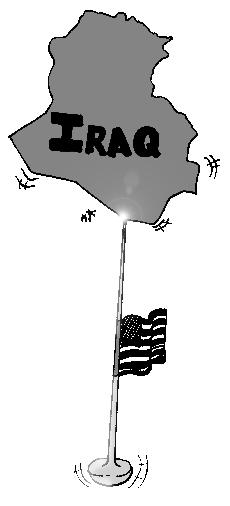Opinion: Rethinking Iraq

Illustration Illustration
September 15, 2004
One of the default catchphrases of the debate over the conflict in Iraq is that the United States can’t afford to cut and run. I say we can’t afford to stay much longer.
Last Tuesday, the 1,000th U.S. military death occurred in Iraq since coalition troops invaded and occupied the country 18 months ago. Also, anywhere from 11,000 to 13,000 Iraqi civilians have lost their lives since the 2002 invasion first began. President Bush, ever the optimist, says his misadventure in Iraq is a “catastrophic success.”
Whether you agree or disagree with the invasion, it can’t be denied the situation in Iraq is getting worse by the day. While political talking heads currently are debating what the presidential candidates did or didn’t do during the Vietnam War, none of them have learned the war’s lesson: that it’s far worse to stick with a bad situation than it is to leave one.
Just look at Iraq, and you’ll see this cloud has no silver lining. U.S.- and U.K.-led occupation forces have lost control over large sections of the country, including cities such as Najaf and Fallujah. Interim Iraqi Prime Minister Iyad Allawi and the new Iraqi government are proving to be ineffective and are seen by the Iraqi people as a U.S.-controlled puppet regime. Acts of terrorism and violence in Iraq have dramatically increased since the invasion. Coalition troops continue to be attacked by militias, insurgents and terrorists; all of whom pose a new and growing security threat to the Iraqi people.
No matter how you look at the issue, you can’t avoid the fact that the situation in Iraq is an expensive and deadly disaster for the United States.
Get The Daily Illini in your inbox!
Unfortunately, the ghosts of Vietnam still haunt Washington. In this election season, the idea of a withdrawal has once again become political poison; nobody is willing to touch it. Neither President Bush nor Sen. John Kerry has any real plan to get us out. This is unfortunate, because a well-executed disengagement from Iraq, or at least the threat of disengagement, could be exactly what the United States needs.
We are caught in a deadly Catch-22. Our continued presence in Iraq, while originally seen as part of an answer to the country’s woes, is now part of the problem. The insurgents freely attack Iraqi troops and police on the premise they are allied with the United States. By eliminating the U.S. presence, we eliminate the credibility of the insurgents. The same goes for the new Iraqi government. It cannot be seen as legitimate as long as it has ties as strong to the United States as it does now.
Removing the U.S. presence from Iraq also would offset the power of insurgent militia leaders. Men like Shiite cleric Moktada al-Sadr draw support, because they are fighting the hated Americans. A U.S. withdrawal would eliminate this support and potentially could force groups like the Shiites and Sunnis to work toward a stable Iraq – if only to prevent foreign terrorists from seizing power.
Furthermore, the threat of a withdrawal could force countries such as Turkey, Kuwait and Saudi Arabia to finally accept their rightful role in helping Iraq. A destabilized Iraq is a threat to every nation in the Middle East, and yet these neighboring countries have done little to help. Aid and peacekeeping troops from nearby Muslim countries would be more welcome in Iraq than from Western nations and especially from the United States.
It is clear the United States is taking the wrong course in Iraq. No matter what strategy is adopted, something new must be done. I’m certainly not advocating complete abandonment; Iraq should be the responsibility of the global community. Yet, Iraq cannot reach stability with the United States looming in the background. A military disengagement or at least the threat to do so could give the United States a strategic edge that is desperately needed in this war.
Eric Naing is a junior in LAS. His column runs Wednesdays. He can be reached at [email protected].






